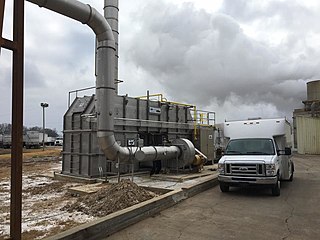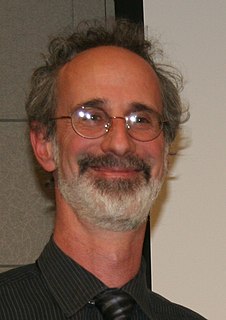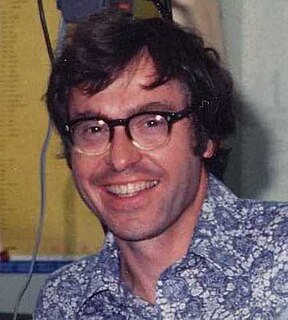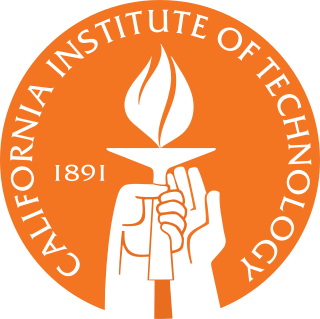
Douglas Carl Engelbart was an American engineer and inventor, and an early computer and Internet pioneer. He is best known for his work on founding the field of human–computer interaction, particularly while at his Augmentation Research Center Lab in SRI International, which resulted in creation of the computer mouse, and the development of hypertext, networked computers, and precursors to graphical user interfaces. These were demonstrated at The Mother of All Demos in 1968. Engelbart's law, the observation that the intrinsic rate of human performance is exponential, is named after him.

Pollution is the introduction of contaminants into the natural environment that cause adverse change. Pollution can take the form of chemical substances or energy, such as noise, heat or light. Pollutants, the components of pollution, can be either foreign substances/energies or naturally occurring contaminants. Pollution is often classed as point source or nonpoint source pollution. In 2015, pollution killed 9 million people in the world.

The environmental movement, also including conservation and green politics, is a diverse scientific, social, and political movement for addressing environmental issues. Environmentalists advocate the sustainable management of resources and stewardship of the environment through changes in public policy and individual behavior. In its recognition of humanity as a participant in ecosystems, the movement is centered on ecology, health, and human rights.

Environmentalism or environmental rights is a broad philosophy, ideology, and social movement regarding concerns for environmental protection and improvement of the health of the environment, particularly as the measure for this health seeks to incorporate the impact of changes to the environment on humans, animals, plants and non-living matter. While environmentalism focuses more on the environmental and nature-related aspects of green ideology and politics, ecology combines the ideology of social ecology and environmentalism. Ecology is more commonly used in continental European languages while ‘environmentalism’ is more commonly used in English but the words have slightly different connotations.

Peter H. Gleick is an American scientist working on issues related to the environment. He works at the Pacific Institute in Oakland, California, which he co-founded in 1987. In 2003 he was awarded a MacArthur Fellowship for his work on water resources. Among the issues he has addressed are conflicts over water resources, water and climate change, development, and human health.
Environmental security examines threats posed by environmental events and trends to individuals, communities or nations. It may focus on the impact of human conflict and international relations on the environment, or on how environmental problems cross state borders.

Environmental policy is the commitment of an organization or government to the laws, regulations, and other policy mechanisms concerning environmental issues. These issues generally include air and water pollution, waste management, ecosystem management, maintenance of biodiversity, the protection of natural resources, wildlife and endangered species. Concerning environmental policy, the importance of implementation of an eco-energy-oriented policy at a global level to address the issues of global warming and climate changes should be accentuated. Policies concerning energy or regulation of toxic substances including pesticides and many types of industrial waste are part of the topic of environmental policy. This policy can be deliberately taken to direct and oversee human activities and thereby prevent harmful effects on the biophysical environment and natural resources, as well as to make sure that changes in the environment do not have harmful effects on humans.

The Royal Netherlands Meteorological Institute is the Dutch national weather forecasting service, which has its headquarters in De Bilt, in the province of Utrecht, Netherlands.
Paul V. Roberts was a prominent environmental engineer. He made major contributions to environmental engineering by applying fundamental principles of mass transport and chemistry to drinking water treatment and wastewater reclamation research. An author of more than 200 scientific publications, he was a member of the National Academy of Engineering and the Swiss Academy of Sciences.

André Léon Georges Chevalier Berger is a Belgian professor and climatologist. He is best known for his significant contribution to the renaissance and further development of the astronomical theory of paleoclimates and as a cited pioneer of the interdisciplinary study of climate dynamics and history.

Chadwick A. Tolman is an American chemist. He obtained his B.S. in Chemistry from Massachusetts Institute of Technology. He earned his Ph.D. in Chemistry as a microwave spectroscopist from U.C. Berkeley under the guidance of Professor William Gwinn.

Elizabeth Jocelyn "Jake" Feinler is an American information scientist. From 1972 until 1989 she was director of the Network Information Systems Center at the Stanford Research Institute. Her group operated the Network Information Center (NIC) for the ARPANET as it evolved into the Defense Data Network (DDN) and the Internet.
Michael Calvin MacCracken, has been chief scientist for climate change programs with the Climate Institute in Washington, D.C., since 2002; he was also elected to its board of directors in 2006.

Weldon Bailey "Hoot" Gibson was an economist and a longtime executive at SRI International, where he worked full-time from 1947 until 1988, and part-time as Senior Director Emeritus until his death. He was closely associated with the organization, and was known as "Mr. SRI".
Jesse Edward Hobson was the director of SRI International from 1947 to 1955. Prior to SRI, he was the director of the Armour Research Foundation.
Steven J. Davis is an earth system scientist at the University of California, Irvine's Department of Earth System Science and holds a joint appointment in the Department of Civil and Environmental Engineering
The contributions of women in climate change have received increasing attention in the early 21st century. Feedback from women and the issues faced by women have been described as "imperative" by the United Nations and "critical" by the Population Reference Bureau. A report by the World Health Organization concluded that incorporating gender-based analysis would "provide more effective climate change mitigation and adaptation."
Michael Greenstone is an American economist and the Milton Friedman Professor in Economics, the College, and the Harris School at the University of Chicago. Moreover, he currently serves as director of the Energy Policy Institute at the University of Chicago (EPIC), director of the Becker Friedman Institute, and acts as co-chair of the Energy and Environment sector at MIT's Abdul Latif Jameel Poverty Action Lab (J-PAL). Under the first Obama administration, he served on the Council of Economic Advisors as chief economist. His research interests focus on the nexus between development economics and environmental economics.
















